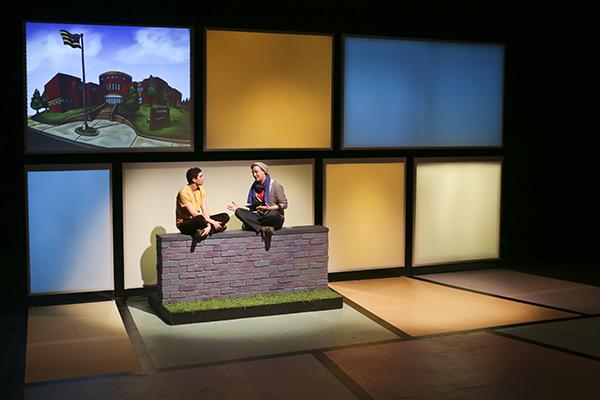The characters of “Peanuts” are lifted from the confines of two-dimensional comic strips in “Dog Sees God: Confessions of a Teenage Blockhead,” a play that puts a mature spin on the goofy gang this weekend.
The iconic characters are all grown up in the first production that GW’s department of theatre and dance will perform this calendar year. Charlie Brown, Beethoven, Peppermint Patty and Schroeder prompt audience members to reflect on their adolescence as the show revels in the woes of uncertainty, self-discovery and emotional turmoil.
The cast of eight, along with stage managers, an assistant director and members of the crew, began rehearsing in mid-January. But the show truly began when Elizabeth Kitsos-Kang, a theater professor, read the script and envisaged the set and the actors who would bring “Peanuts” up to date with the issues that plague adolescents today.
“[‘Dog Sees God’] is funny and thought-provoking, uncomfortable and moving. That’s all the things theater should be. That’s why I was drawn to it,” she said.
After 21 years of directing the “Scenes from College Life,” the skits that mark the start of every incoming GW students’ career at Colonial Inauguration, Kang is no stranger to material with social commentary.
“What I really love about theater for social change is that it allows the art form to be an educational process for the audience,” she said.
Silvio Weisner, the director of University Counseling Center, joined the cast to discuss the issues that each of their characters face within the story. Kang said it was important to help students process some of the issues that are addressed, which include questioning one’s sexuality, suicide and eating disorders.
The actors, who take on the burden of their respective teenaged characters once they step on stage, said that part of the production process proved to be invaluable in shaping the way they would portray their characters. Weisner helped clarify what attitudes and behaviors could be apparent in each character given his or her circumstances.
Annie Ottati, a junior who plays Tricia, said talking to Weisner helped bring the characters’ issues to life.
“He made it a reality and made [the characters] more credible,” she said.
And Shane Moran, a junior who plays the role of Matt, said Weisner encouraged him and his fellow cast members to keep “adding layers to [their] characters to make them three dimensional, not just stereotypes.”
The actors have to move into uncomfortable spaces and be completely vulnerable to let the audience grasp the feelings of the characters on stage, Kang said.
Kang thought the creation of this intimacy was the greatest challenge for herself, the cast and the crew. But with the talent and devotion of each member of the production team, she said transitioning into the world of Charlie and his friends felt seamless.
Nick Ong, a senior and former Hatchet sports editor who plays Beethoven, said the play will have audiences feeling an undeniable sense of nostalgia as they embark on relatable emotional journeys with each character.
“Meeting with Silvio [Weisner], was an eye-opening experience to how relevant the topics in this play are,” he said.
Samantha Gonzalez, a freshman who plays Marcey, said she came to her audition for “Dog Sees God” with an open mind. But when she read for the part of Marcey, she found the character’s story most compelling.
“The story touches a lot of stuff we all struggle with on a subconscious level,” Gonzalez said. “The characters have grown up to show that perfection isn’t possible. The show changes our preconceived notion of the transition from the American childhood to the American adolescents.”
Kang said the aspect of this production that distinguishes it from others is the “talk back” that will take place after the performance on Friday.
Talk backs give the student cast the opportunity to speak with the audience at the end of the show and answer any questions about the production. The cast will be joined by professor Stephen Forssell, program director of the LGBT health policy and practice graduate certificate program, who will moderate the conversation.
“Dog Sees God: Confessions of a Teenage Blockhead” will be shown at the Dorothy Betts Marvin Theatre on Friday and Saturday at 7:30 p.m. and Sunday at 2 p.m.
“I want [the audience] to feel. I want them to be moved. I want them to laugh,” Kang said. “I want them to identify with characters on that stage and say either, ‘That’s me,’ or ‘That used to be me,’ or ‘That’s who I never want to be.’ That’s what theater is about.”







